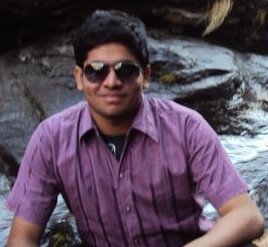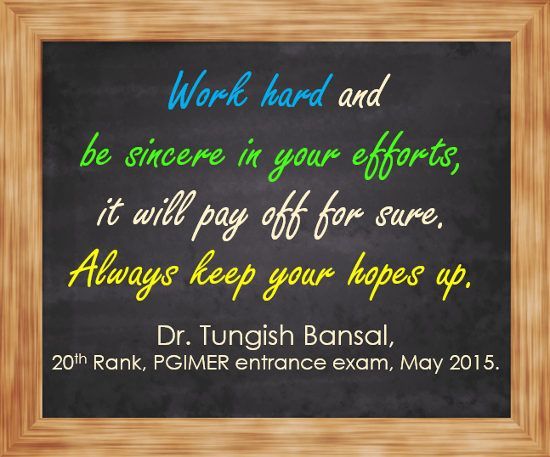PGI entrance topper interview: Dr.Tungish Bansal, 20th Rank, May 2015
 PGI entrance topper – Dr. Tungish Bansal
PGI entrance topper – Dr. Tungish Bansal
PG Blazer: Congratulations on securing a top rank in the PGI entrance exam! What is the secret of your success?
Dr. Tungish Bansal: Never giving up is the key to success. Will to succeed and persistence will get you what you want.
PG Blazer: Could you tell us something about yourself?
Dr. Tungish Bansal: I am from Sirsa, Haryana. Both my parents and 2 elder sisters are doctors. I did my schooling from St. Xavier’s, Sirsa. I attended medical school at AIIMS, New Delhi.
PG Blazer: Who or what influenced you to take up Medicine as a career?
Dr. Tungish Bansal: Both my parents are doctors. they influenced me to take medicine as career.
PG Blazer: What were your aggregate percentage marks for MBBS?
Dr. Tungish Bansal: 67.9%.
PG Blazer: How did you prepare during your internship period?
Dr. Tungish Bansal: During internship I had joined Bhatia T & D and finished subjects along with that. A mistake I did was that i didn’t organize what I read properly. So with the little time I was left with in the end, I couldn’t revise the subjects as I would have liked to. I would like to advise you all to organize what ever you read. After you finish a subject, sit down for an hour and write what you have read from where and how you intend to revise the subject when you have to finish the subject in a day (for which you had dedicated a week earlier). This hour of organizing things, will be the best thing you would have done for yourself.
PG Blazer: Which were the various entrance exams you wrote in this session? What were the ranks you obtained?
Dr. Tungish Bansal: AIIMS – 129,
PGI – 20.
PG Blazer: What ranks did you obtain in your previous attempts?
Dr. Tungish Bansal: AIIMS – 562,
PGI – 108,
All India – 1307.
PG Blazer: What changes did you make to your preparation after your last attempt?
Dr. Tungish Bansal: I concentrated a bit more on theory than on MCQ’s. My aim was to finish the course early and leave enough time for revision. Revision is the key. My motto was to read what I will be able to revise. And finally it does matter what you do on exam day too. I messed up my May AIIMS paper due to high anxiety levels. So its very important to keep your cool.
PG Blazer: When did you start serious preparation for this year’s entrance exam?
Dr. Tungish Bansal: During internship.
PG Blazer: What was your study strategy?
Dr. Tungish Bansal: I concentrated on theory more than MCQ’s. Doing the last 5 years papers of the exam you are concentrating on early is a good idea to know the the frequently asked and important topics. You can concentrate on these topics more while reading the theory. Its really important to give GT/FTS frequently and seriously. They will really help you identify your weak topics and help develop the stamina to concentrate for 3 hours straight.
PG Blazer: Did you make any notes for helping with your revision? Were they useful?
Dr. Tungish Bansal: Yes i did make my own notes. I used to note down topics and points I frequently forgot and they were really helpful for me. I used them frequently to revise quickly.
PG Blazer: In your opinion, how much time does a student require for preparing for this exam?
Dr. Tungish Bansal: An year of serious and well directed study is enough.
PG Blazer: How many hours did you study each day?
Dr. Tungish Bansal: Depended on the time I got. Mostly varying between 6- 10 hours.
PG Blazer: Did you have a timetable for preparation? Were you able to stick to it?
Dr. Tungish Bansal: Yes I did prepare a timetable. I stuck to it mostly. Its important to remember to finish subjects you find difficult early, so they don’t haunt you in the end. And while doing a subject start your day with the topics you find most difficult. So that if you have to leave a few topics due to time constraints, they are ones you know already.
PG Blazer: What role did the internet play in your preparation?
Dr. Tungish Bansal: Internet is a important tool if used in the right way. But you should rely only on reliable sources and not on random sources. Also its easy to deviate from the topic you are searching and end up wasting time. One should be careful about that.
PG Blazer: Did you ever doubt your ability to get selected in this entrance exam? If so, how did you overcome your fears?
Dr. Tungish Bansal: Well many times. I used to talk to my friends and seniors about it. Their advice at times was quite helpful. I also use to get motivated by seeing the success of my seniors and build up my own confidence that if they can do it, I can too.
PG Blazer: Did you attend any classroom coaching? Was it useful? Do you think classroom coaching is essential for getting a good rank?
Dr. Tungish Bansal: Yes I attended coaching for final year subjects in my 8th semester at DAMS. It was useful as it built a base on which I could add on. Also there is nothing better than your own handwritten notes to revise in the end.
PG Blazer: Did you attend any test series? If so, did you find it useful?
Dr. Tungish Bansal: Yes I did join bhatia T&D in my internship. It was useful because it helped me remain on track and not leave any subjects behind. Another advantage was some frequently asked topics and concepts were covered in a very lucid and simple way, which would be difficult and time consuming for you to compile yourself.
PG Blazer: What were the subjects you focused upon?
Dr. Tungish Bansal: I focused more on anatomy, pathology, pharmacology, PSM and the short subjects. From PGI point of view it is important to cover topics like immunology and transplant, radiotherapy, and the DNA/RNA part and recent techniques from biochemistry. These topics constitute around 12- 20 questions and will definitely give you an edge over others.
PG Blazer: Which books did you read for theory?
Dr. Tungish Bansal: Anatomy –B.D. Chaurasia
Physiology – Ganong and Bijlani
Biochemistry – Harper
Pathology – Robbins
Microbiology – Ananthnarayan
Pharmacology –K. D. tripathi
Forensic Medicine – Parikh
ENT – Dhingra
Ophthalmology – DAMS notes
SPM – Park
Medicine – CMDT and Harrison’s hand manual
Surgery – Bailey
Orthopaedics – Maheshwari
Paediatrics – O. P. Ghai
OBG – J. B. Sharma for obs and IAMS notes for gyane
Anaesthesia – IAMS notes
Radiology – S. Sethi review
Dermatology – Neena Khanna
Psychiatry – Niraj ahuja
PG Blazer: What was your approach to Harrison’s Principles of Internal Medicine?
Dr. Tungish Bansal: I read only the hand manual of Harrison. So can’t elaborate much on that.
PG Blazer: Which books did you read for MCQ’s? Which ones were the most useful?
Dr. Tungish Bansal: Anatomy – Across
Physiology – DAMS notes
Biochemistry – IAMS modules
Pathology – Review of pathology by Gobind Rai Garg
Microbiology – Rachna Chaurasia
Pharmacology – Gobing Rai Garg
Forensic Medicine – Sumit Seth
ENT – DAMS notes
Ophthalmology – DAMS notes
SPM – Vivek Jain
Medicine – Mudit Khanna
Surgery – Amit Ashish
Orthopaedics – Apurv Mehra
Paediatrics – IAMS module
OBG – IAMS module
Anaesthesia – IAMS module
Radiology – Sumer sethi
Dermatology – IAMS module
Psychiatry – IAMS module
PG Blazer: Is there anything specific to keep in mind while preparing for AIIMS?
Dr. Tungish Bansal: Do the 10 years early but don’t rely only on them. The no. of repeats these days are less, so its important to read the theory properly. Go through recent updates especially in PSM. And finally its most important to keep your cool on that day.
PG Blazer: How did you tackle the PGIMER entrance exam?
Dr. Tungish Bansal: I would like to highlight a few points. First the paper is really long. Ao join a pgi test series ( Adrplexus and NIME offer it). Try to complete these practise test in time. Don’t linger on a question too much. Keep reminding yourself to maintain speed. Secondly read the stem of the question carefully. There are 5 combinations which of the following is true, which is false, all are true except, all are false except, and which is not true. You have to be careful about the last 3 and especially the last one.
PG Blazer: How did you prepare for the image based questions?
Dr. Tungish Bansal: I didn’t prepare for them specifically. But seeing the recent AIIMS pattern, looking at all the pics from Neena Khanna book of Dermatology can be very high yielding.
PG Blazer: What was your strategy for revision on the day before the examination?
Dr. Tungish Bansal: I had made notes of important stuff which is very volatile (like biochem cycles, PSM data, IPC etc) and kept that for revision on the last day.
PG Blazer: What was your strategy for taking the exam?
Dr. Tungish Bansal: I started from the beginning and answered all the questions
PG Blazer: How many questions did you attempt?
Dr. Tungish Bansal: AIIMS – 199,
PGI – 246.
PG Blazer: How many do you think you got correct?
Dr. Tungish Bansal: AIIMS – 138-140.
PG Blazer: Which speciality are you interested in choosing and why?
Dr. Tungish Bansal: I will be choosing a surgical branch because I have always been interested in that.
PG Blazer: What is your advice to future aspirants?
Dr. Tungish Bansal: Work hard and be sincere in your efforts, it will pay off for sure. Always keep your hopes up. To summarize a few lines from a poem “Life’s battles don’t always go to the stronger or faster man, But soon or late the man who wins is the one who thinks he can”.
PG Blazer: Please give your comments / suggestions regarding PG Blazer.
Dr. Tungish Bansal: It is a great initiative. I read quite a few interviews during my preparation and they helped me alot to stay up and motivated.
PG Blazer: That brings us to the conclusion of the interview. Best of luck for your future endeavours!






